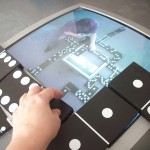A number of TV-games that I tried out before hitting on the Double Solo game.…
Immersed perception and artistic games
Posted by Everdien on 3/08/10 • Categorized as All posts
 Schemes enable us to play games, for they enable us to relate what we are doing and seeing to a ready-made store of similar acts and objects which we have stored from previous play/game experience. Schemes may be as simple as the series of understandings and rules that enable us to both recognize what a game of hide and seek is and how to play this particular game, or as complex as our understanding of chess and our store of knowledge about chess variations and moves. Schemes enhance our pleasure in, say, playing a game of table tennis, because they provide a framework that frees us to focus intently on the play experience itself. The predictability afforded by games makes them ideally suited for the trance-like playing that is the hallmark of the immersive playing experience.
Schemes enable us to play games, for they enable us to relate what we are doing and seeing to a ready-made store of similar acts and objects which we have stored from previous play/game experience. Schemes may be as simple as the series of understandings and rules that enable us to both recognize what a game of hide and seek is and how to play this particular game, or as complex as our understanding of chess and our store of knowledge about chess variations and moves. Schemes enhance our pleasure in, say, playing a game of table tennis, because they provide a framework that frees us to focus intently on the play experience itself. The predictability afforded by games makes them ideally suited for the trance-like playing that is the hallmark of the immersive playing experience.
Highly normative schemes enable players to lose themselves in the game in a state of what I will call ‘immersed perception’: when immersed in a game, players’ perceptions, reactions, and interactions all take place within the frame of the game. Which suggests a single scheme and a few definite scripts for highly directed interaction. Conversely, contradictory schemes or elements that defy conventional schemes tend to disrupt players immersion in the game, disabling immersive perception.
As we might expect, immersive experiences create avid players, as players pursue immersion to temporarily escape the stress of everyday life or to exploit a fictional narrative as an antidote to the mundanity of their own lives.
The earliest interactive videogames drew their cues heavily from a singular scheme, turning the early commercial computer games into glamorised versions of video arcade games. The early game developers hit the mark by founding their first games on two essentials: a recipe for interaction that was engrossing, and normative schemes borrowed from already familiar forms of entertainment.
In immersive interactive games our pleasure stems from our ability to follow a single schema and the several scripts it offers us for both interpretation and directed action. Before we so much as glimpse the title screens of your typical digital quest, we already know we need to listen intently, collect everything we can lay our hands on, and put together our tools and clues to solve the challenges that confront us. Which in turn will enable us to reach the game’s goal: usually something like changing the course of history or saving the planet. While predictability is fine for game designers, artists will rely on disruption of clear scripts. They will disrupt immersion in order to take a critical stand; they force the player to come out of the frame of the game.
Gerelateerd:
-
Game room games
| « Ping Pond play | <-- previous post | next post --> | Conversational ping-pong » |
|---|







